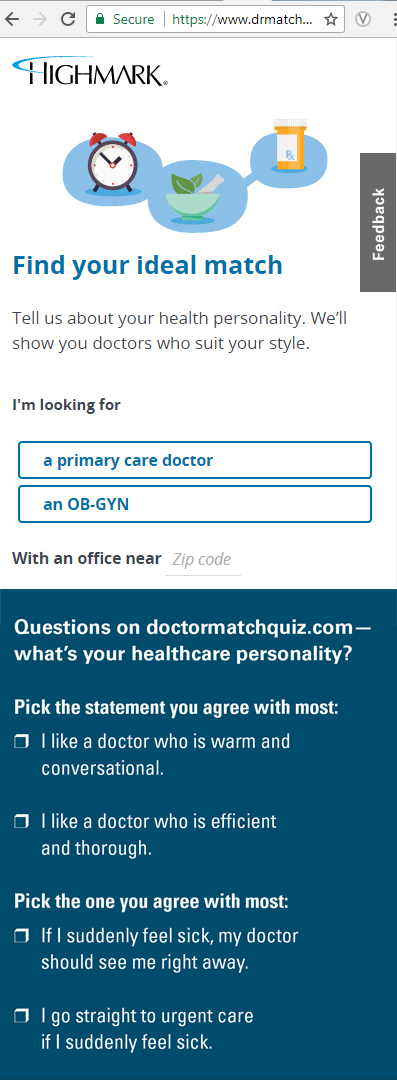Using data to help patients find Dr. Right

There’s mounting evidence that a long-term relationship with a primary care provider can mean the difference between preventing or keeping chronic conditions under control and ending up needing higher levels of care. For instance, a 2017 study in the journal BMJ found that older patients who stuck with a primary care provider (PCP) had nearly 13 percent fewer hospital admissions than those who didn’t have a long-term relationship with a PCPi. Another study in the journal Pediatrics found that children with the lowest continuity of care were nearly 60 percent more likely to visit the emergency department than those with the highest continuity of careii. But finding the right doctor can be difficult, given the typical information found in an online provider directory.
Highmark Blue Cross Blue Shield (BCBS) discovered that some members weren’t taking advantage of having a PCP. So the company has found a way to marry the power of computer algorithms with the familiarity of online dating to help patients find the right doctor. Doctormatchquiz.com is an online tool that helps patients find a doctor whose approach to care matches their preferences, and more easily switch to that doctor. The tool is available now in Western Pennsylvania with plans to make it available to all Highmark BCBS markets in 2018.
“A lot of tools provide a lot of information that, in theory, help consumers find a doctor,” says Stacy Byers, director of digital marketing for Highmark BCBS. Lots of health insurers list a doctor’s specialty, board certifications, phone number, address and hospital affiliations. But that information can’t really predict a doctor and patient’s compatibility.
Byers says compatibility matters because sticking with the same doctor over time improves health outcomes. Patients who have satisfying relationships with their doctors are more likely to follow that doctor’s recommendations and be open to difficult discussions, such as those about mental health. Doctors are also looking for patients who will stay with them long term. It’s a win-win for both. But why use an online quiz to determine compatibility? Because, says Byers, “more and more people are comfortable using online tools, like for dating relationships.”
 Here’s how it works: Highmark BCBS members go to doctormatchquiz.com and answer a series of questions about their healthcare preferences.
Here’s how it works: Highmark BCBS members go to doctormatchquiz.com and answer a series of questions about their healthcare preferences.
The entire quiz takes about 10 to 15 minutes and results in a list of nearby doctors who match a patient’s preferences. Byers says about 90 percent of the site’s visitors who get to the first question after entering their zip code complete the quiz; so far, that’s about 23,000 people. If they decide to switch to one of the doctors they’re matched with, a customer service representative finalizes the paperwork over the phone. Byers says it’s still early on, but users surveyed after taking the quiz have said the tool helped them find a new doctor or confirm their current doctor is a good match.
Behind the algorithm
Determining compatibility can be tricky, says Byers. “How do we ask the patient the right questions to make the match? How do we elicit authentic responses from doctors about their style?”
Byers says the tool’s designers developed a similar set of questions for patients and doctors and then tested those questions repeatedly with both groups. “We had to be thoughtful about the phrasing, especially,” she says. “But at the heart of it, we knew that physicians would want to answer authentically.” An algorithm then helps find matches.
Byers says the Highmark BCBS team hopes the tool not only increases patient satisfaction but boosts the likelihood they’ll see their primary care provider regularly. “Preventive care is a really critical component of long-term health,” says Byers. “We know that not all of our members take advantage of that kind of care.” Finding Dr. Right might just change that.
i Barker Isaac, Steventon Adam, Deeny Sarah R. Association between continuity of care in general practice and hospital admissions for ambulatory care sensitive conditions: cross sectional study of routinely collected, person level data BMJ 2017;356 :j84
ii Association of Lower Continuity of Care With Greater Risk of Emergency Department Use and Hospitalization in Children. Dimitri A. Christakis, Loren Mell, Thomas D. Koepsell, Frederick J. Zimmerman, Frederick A. Connell. Pediatrics Mar 2001, 107 (3) 524-529; DOI: 10.1542/peds.107.3.524
